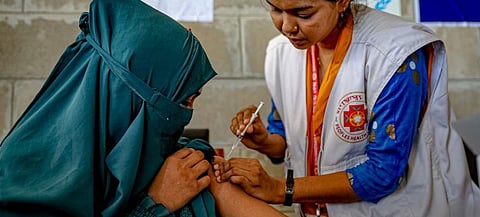

Vaccine inequity is not a novel phenomenon but has only been highlighted and exacerbated by the COVID-19 pandemic. Critical vaccines in demand by high-income countries continue to be in short supply for low-income countries, according to a new report by the World Health Organization.
Decades-long progress in development, supply and access to doses remains overshadowed by an unfavourable environment. And limited market incentive plagues the development of key vaccines, according to the Global Vaccine Market Report 2022, released November 9, 2022.
The burden of cervical cancer is higher in low-income countries in spite of which the human papillomavirus vaccine has been introduced only in 41 per cent of these countries. In comparison, 83 per cent of high-income countries have access to the HPV vaccine.
“The right to health includes the right to vaccines,” said WHO Director-General Dr Tedros Adhanom Ghebreyesus.
This new report shows that free-market dynamics deprive some of the world’s poorest and most vulnerable people of that right, said Ghebreyesus.
Also read: Is the COVID-19 vaccine story over?
“WHO is calling for much-needed changes to the global vaccine market to save lives, prevent disease and prepare for future crises,” Ghebreyesus added.
The COVID-19 vaccine accounted for most of the 16 billion vaccine doses, worth $141 billion, supplied in 2021.
This was a major push for the market — with the volume rising three-fold compared to 2019 ($5.8 billion) and nearly three-and-a-half times the 2019 market value ($38 billion).
This serves as a prime example of how vaccine manufacturing can be scaled and supplied.
More than 90 manufacturers were supplying vaccines to WHO member states across the world in 2021. However, less than 10 managed a bulk of the supply due to “broad portfolios, global reach and a diversity of deployable technology.”
Only two manufacturers are supplying key vaccines such as pneumococcal vaccines, measles and rubella-containing vaccines across the world.
Policies and supply chains in specific regions dictate access to vaccines, due to which the African and eastern Mediterranean regions fare the worst.
These regions rely on international manufacturers for 90 per cent of their procured vaccines.
The past two years have made record figures in vaccine supply. But they are also marked by historic backsliding in routine immunisation of children.
It may not be possible to recover from this setback or ensure equitable access if current market dynamics persist, Ghebreyesus noted.
Price disparities force middle-income countries to pay as much as or more than high-income countries for vaccines.
We must work to shape a more favourable intellectual property landscape for proactive technology transfers and capacity building in every region,” Ghebreyesus added.
The COVID-19 vaccine drive has shown “public investment, streamlined processes, new technologies, pooled financing and procurement are not sufficient to achieve optimal public benefit,” he added.
Lack of transparency in vaccine manufacturing and supply and insufficient government oversight in the distribution of doses remain the key hurdles. Governments, industry, international institutions and partners must act soon to tackle vaccine inequity.
The Global Vaccine Market Report listed possible changes which can be made to initiate a paradigm shift in the vaccine market. These include: “clear immunisation plans and more aggressive investment and stronger oversight of vaccine development, production and distribution.”